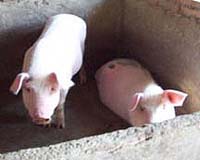 |
Kavre, Nepal (AFP) Dec 15, 2009 Thirty years ago, Nepalese farmer Badri Prasad Jangam realised that the once thickly-wooded hillside that overlooks his home had been transformed into a barren slope. Decades of deforestation had taken their toll, stripping away the topsoil, affecting vital underground water sources and threatening to bring disaster to a community entirely dependent on farming for its livelihood. Now the trees are back, thanks to an innovative government scheme that won international plaudits for handing responsibility for the preservation of Nepal's forests over to local people. "No one was taking responsibility for the forest thirty years ago," the 76-year-old farmer told AFP in Kavre district, 20 kilometres (12 miles) east of the capital Kathmandu. "People were cutting down trees for fuel and the forest got more and more sparse. So we worked as a community to protect it, planting new trees and preventing people from using the forest for firewood." Nepal began handing forests over to local communities in the late 1970s in a desperate bid to stem illegal deforestation, which the government lacked the resources to halt. Three decades on, the Federation of Community Forestry Users Nepal (FECOFUN) says around a million hectares (2.5 million acres) of forest previously owned by the government is thriving under the control of neighbourhood groups. "State control over the forests was ineffective because the government failed to engage local people in forest governance," said Bhola Bhattarai, general secretary of FECOFUN. "When control was handed over to local people, it made them responsible." Nepal relies on wood for around two-thirds of its energy needs, and the scheme benefits local people by giving them direct control over their principal fuel source. The replanting of acacia, pine and sal trees also means more forest to absorb carbon dioxide, contributing to the reduction of global warming in a country where climate change is already taking its toll. Scientists say temperatures in Nepal are rising at a much faster rate than the global average, causing the Himalayan glaciers to melt and form giant lakes that threaten to burst, devastating communities downstream. Climate change experts also predict that Nepal will experience shorter, more intense bursts of rainfall in the future, increasing the risk of flooding and landslides. "The forests are critical for addressing climate change," Nepal's Environment Minister Thakur Prasad Sharma told AFP. "For poor countries like ours, it is a low-cost mitigation option to fight the negative impact of climate change in the form of landslides, floods and erosion. "The challenge for us today is to synchronise community forestry management with the emerging global climate policy." The Nepal government has said it aims to increase the country's forest cover to 40 percent from the current level of around 27 percent. It is also hoping to make money through re-forestation, said Krishna Prasad Acharya, head of the government's REDD (Reducing Emissions from Deforestation and Forest Degradation) scheme. REDD is a UN mechanism to reduce deforestation, whereby richer countries would provide financial incentives to protect forests in poorer nations. It is expected to be one of the cornerstones of any agreement at the UN Copenhagen climate conference being held this week, and could eventually channel tens of billions of dollars a year from rich to poor countries. "Community forestry is no longer just a local issue. The community-managed forests are becoming an important carbon pool," Acharya told AFP. "The preservation of forests in order to fight climate change is becoming increasingly urgent." Share This Article With Planet Earth
Related Links Farming Today - Suppliers and Technology
 Taiwan farmers potty-train pigs to curb pollution
Taiwan farmers potty-train pigs to curb pollutionTaipei (AFP) Dec 14, 2009 Farmers in southern Taiwan have started to potty-train their pigs in response to a planned water pollution fee, breeders and officials said Monday. To keep their livestock from defecating into nearby rivers, a growing number of farms have established special "toilets" smeared with faeces and urine to attract the pigs -- and farmers say the results have been very encouraging. ... read more |
|
| The content herein, unless otherwise known to be public domain, are Copyright 1995-2009 - SpaceDaily. AFP and UPI Wire Stories are copyright Agence France-Presse and United Press International. ESA Portal Reports are copyright European Space Agency. All NASA sourced material is public domain. Additional copyrights may apply in whole or part to other bona fide parties. Advertising does not imply endorsement,agreement or approval of any opinions, statements or information provided by SpaceDaily on any Web page published or hosted by SpaceDaily. Privacy Statement |